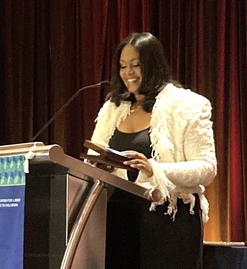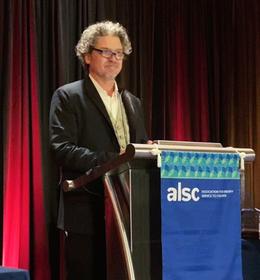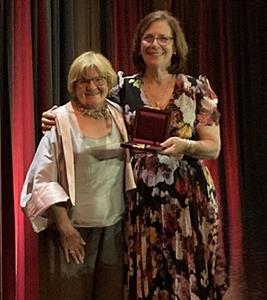At ALA's Annual Conference in San Diego, Calif., earlier this week, hundreds of librarians, authors, illustrators, and publishing professionals gathered at a banquet to celebrate the winners of the Association for Library Service to Children's three longest-running awards: the Randolph Caldecott Medal, the John Newbery Medal, and the Children's Literature Legacy Award.

|
|
| Vashti Harrison | |
Vashti Harrison became the first Black woman to receive the Caldecott Medal, for her picture book Big (Little). This is how Harrison started her speech: "Did you know you're the first Black woman to win the Caldecott Medal? My agent called to ask me this. She was telling me that my life was about to change, so get ready. I was not ready." Harrison asked the crowd how she could possibly carry this title, possibly represent the Platonic ideal of "Black Woman Illustrator" when "there are so many visionaries who came before me?" So Harrison returned to her roots as an author and illustrator and used her time to highlight the seven Black Caldecott Honor-winning women who came before her: Faith Ringgold, Carole Byard, Ekua Holmes, Oge Mora, Cozbi A. Cabrera, Noa Denmon, and Janelle Washington. "I want to thank all of these women for their determination and creativity that paved a way for me."
Harrison spoke of beginning her career by drawing bodies that looked nothing like her--"long lean slender bodies." In time, she became conscious of her tendency to draw white or light-skinned women. As she was becoming aware of her implicit bias, "the world was changing. Eric Garner pleaded 'I can't breathe' while he was choked to death." Harrison watched Black women start the Black Lives Matter movement and she thought, "Black lives do matter. Black joy matters. Black stories matter. And Black art matters." And so she began to draw "beautiful Black women." But these beautiful Black women were "impossibly thin." Drawing became impossible for Harrison, who began to agonize over every sketch: "Every choice is political. Hair is political. Skin choice is political. Bodies are political." So Harrison resolved to draw only children: "Children who are allowed to be chunky. Children for whom big is good." But, she wondered, at what age does big start being bad?
Harrison admitted she was ashamed to tell the next part of her story: "I was visiting a school for a book event." She saw a Black girl, happy, laughing, and wearing a pink and purple tutu that rode up over her round belly. The artist thought, "she should know better than to wear a skirt like that." Harrison had fallen into the adultification bias, a form of prejudice in which adults view children as being "more adult, more mature, and more responsible than their age would suggest." "How dare I?" Harrison admonished herself. "That girl in her tutu could have been me. I saw in her my hair, my skin, my round belly, my joy, my silliness, and I saw how this bias left a scar in my body. I thought maybe I could create a world where girls never had to hurt like this." Big is the product of that desire. Harrison created the book in solitude during the pandemic: "I struggled with isolation, loneliness, and depression long before the lockdown, and fell even deeper during it." But with the help and insight of other authors and illustrators, she created a book designed "to bring readers inside the girl's perspective." Harrison implored the crowd to do the work to address and dismantle their implicit bias. "While this award feels overwhelming and a little terrifying," she finished, "I cherish it with all my heart."

|
|
| Dave Eggers | |
Dave Eggers spoke after Harrison, placing his Newbery Medal for The Eyes and the Impossible (Knopf) on the podium next to an old, handmade book. Eggers told the audience that his career had begun with writing and illustrating books in elementary school. While his first book had featured various monsters using his head as a ball for different sports, his second book was "about a boy who was terrified of the dark and what might be lurking in the closet. The boy opened the closet one day and found a furry, horned creature who was a monster--yes, but a nice monster." The teacher entered his book into an Illinois statewide competition, which allowed young Eggers to attend a celebration for those who had received honors in the contest. When he and his mother arrived at the ceremony, Gwendolyn Brooks was officiating. "Does that make any sense at all?" Eggers asked. "How was she there? Like every child in school, I assumed every author we read was dead." Eggers remembers "nothing about her speech" but the words "welcome" and "fellow authors." Eggers held up the handmade book that had brought him face to face with Gwendolyn Brooks: "I was never the same."
Eggers recalled that his mother had loved the library; she would guide him toward Newbery winners, and he would inevitably choose books about monsters. "My mother passed away at age 51 and my dad at age 54," Eggers said, beginning to choke up. "I've never told anyone this, but I vowed if I made it past 50, I would write whatever the hell I wanted to write from then on. So, when I hit 50, I decided I wanted to do something not so logical for a person of five decades, and that was write a story about a dog who ate garbage." The Eyes and the Impossible, Eggers said, "was my love letter to being alive past 50. This is the most personal book I have written and also the weirdest." Johannes, the dog protagonist of the book, "gave me a way to write the way I've always wanted to write, sing the way I've always wanted to sing." This book also gave Eggers "maybe the most respect my writing has ever gotten from my kid": when he told his son he had won the Newbery Medal, his son responded, "Whoa, like New Kid?"
 |
|
| Pam Muñoz Ryan (r.) with Caroline Ward, chair of the Children's Literature Legacy Award committee. | |
The final speaker was Pam Muñoz Ryan, winner of the Children's Literature Legacy Award. Esperanza Rising (Scholastic), Ryan's 2000 novel that won her the Pura Belpré Medal, paralleled her grandmother's emigration. "My mother was born in the camp depicted in the book," Ryan said. Next year, Esperanza Rising will celebrate 25 years in print. "When I look back, I think about how unlikely it is that I'm standing before you. I didn't grow up in a print-rich environment and I didn't discover books beyond classroom textbooks until the fifth grade." It was her grandmothers--who shared folktales and delighted in gossip--who ignited Ryan's love of story. The library, she said, was more an escape than a place to read: "I didn't go there intending to check out books." But once the books made themselves known to her, "I was captured. I carried books to the kitchen table, the car, and I secretly hid them inside textbooks." As she grew into "an awkward sullen, acne-ridden adolescent," she "coped through books." It is no surprise, Ryan said, that she now writes "for readers who are the same age as I was when books made the most profound difference in my life."
Ryan told a story about her grandmother embarrassing her at the market. The author was at an age where she didn't want to be looked at, let alone have her grandmother focus attention on her. But her grandmother demanded the butcher comment on how very beautiful her granddaughter was. The butcher remained silent. "In the way of her sometimes-strange translation from Spanish to English," Ryan recalled, "my grandmother took me outside and said, 'He only see the outside of you, he doesn't see the bones of you.' " At the time, this meant nothing to Ryan. "Now I know she meant that he couldn't see my core. The essence of me. The potential of me. And isn't that something we all hope? That someone will see the beauty inside of us? Isn't that something we hope for young readers, too? That someone will recognize their worth and value them for their spirit?" Writers and illustrators, she said, are creating for an audience they cannot see, writing in hopes of touching the bones. "We write and draw shackled to the beautiful tyranny of now. We work with hearts full of hope for the future.... It's an honor to share this stage and do this important work. I can't wait to find out what comes next." --Siân Gaetano, children's and YA editor, Shelf Awareness

